![]()
![]()
![]()
Use LEFT and RIGHT arrow keys to navigate between flashcards;
Use UP and DOWN arrow keys to flip the card;
H to show hint;
A reads text to speech;
25 Cards in this Set
- Front
- Back
|
meno mosso
|
"Less moved"; indicates a change to a slower tempo
|
|
|
marcato
|
"Marked", stressed; i.e. emphasizing each note; it often indicates a melody that should be given prominence
|
|
|
subito
|
"Suddenly", "immediately"; a word found in scores in such contexts as subito piano (suddenly quiet), etc.
|
|

|
Abbreviation for sforzando followed immediately by piano, i.e. strongly accented note followed by a quiet note or passage
|
|
|
rall. (Rallentando)
|
slowing down, gradually
|
|
|
rubato
|
"Robbed"; the practice in performance of disregarding strict time, 'robbing' some note-values for expressive effect and creating an atmosphere of spontaneity
|
|
|
a tempo
|
Denotes reversion to speed at beginning of piece or movement after a deviation
|
|

|
gradually getting louder
|
|
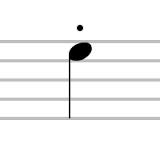
|
method of playing/singing a note so that it is shortened by being held for less than its full value
|
|
|
div.
|
an instruction for one section of the ensemble to divide itself into two or more, taking separate parts that are often notated on the same staff
|
|
|
poco rit. (Poco Ritardando)
|
becoming a little slower
|
|
|
maestoso
|
"Majestic", "dignified"' a term used alone as an indication of mood or a s a tempo designation; it also appears as a modification of some other tempo mark
|
|
|
allargando
|
"Broadening", i.e. becoming slower, often with an accompanying crescendo
|
|
|
tutti
|
"All"' a word used in musical contexts primarily as a contrast to soli or solo
|
|
|
legato
|
"Bound", i.e. played smoothly with no noticeable breaks between the notes
|
|
|
con gusto
|
"With style", "with zest", i.e. with appropriate speed, phrasing, etc.
|
|
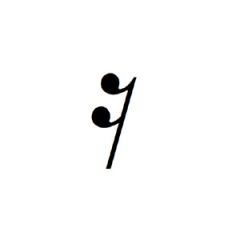
|
denotes silence for one sixteenth the duration of a whole rest
|
|
|
sim.
|
composer's direction in score to indicate that phrase, etc, is to be performed in the same manner as parallel preceding phrase, thus avoiding copying expression marks at each repetition
|
|
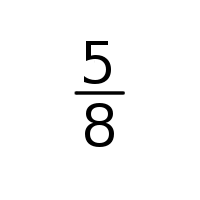
|
Time signature denoting quintuple time, where there are five beats in a measure; typically the eighth note beats are subdivided into either 2+3 or 3+2, placing the principle accents on 1st, and 3rd or 4th beats of a measure
|
|
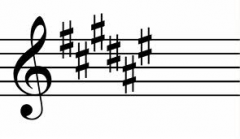
|
F Sharp Major / D Sharp Minor Key Signature
|
|

|
a derivation of a triplets; signifying a two-beat note plus a one-beat note to be performed in the time of two one-beat notes.
|
|

|
Pianissimo; very quiet
|
|

|
Luftpause; a pause for breath in singing
|
|
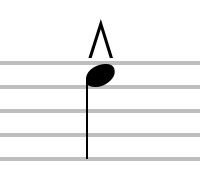
|
Marcato ("Marked", stressed); emphasizing each note; it often indicates a melody that should be given prominence
|
|
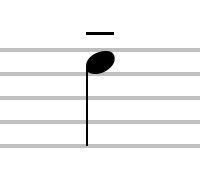
|
Tenuto (held); i.e. sustained to the end of a note's full value
|

